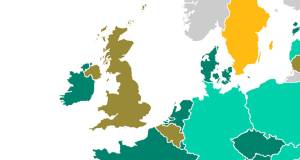- Government
- Posted
Green groups criticse new EU energy efficiency plan

Environmental groups have criticised the EU's new Energy Efficiency Directive for failing to mandate member states to make big energy savings over the next decade.
According to the European Commission, the plan will deliver 20% energy savings across the union by 2020. However, Friends of the Earth said the directive would "not make savings to the extent promised, or on the scale needed to fight climate change".
Environmental groups have criticised the EU's new Energy Efficiency Directive for failing to mandate member states to make big energy savings over the next decade.
According to the European Commission, the plan will deliver 20% energy savings across the union by 2020. However, Friends of the Earth said the directive would "not make savings to the extent promised, or on the scale needed to fight climate change".
"The European Commission is fooling itself if it believes the energy efficiency directive will deliver the 20% savings target. Its own internal analyses show that only a binding target will suffice," said Brook Riles of Friends of the Earth Europe. "Instead of showing leadership the European Commission is giving in to industry scaremongering and pandering to the lack of understanding among national governments."
The World Wildlife Fund also criticised the lack of binding targets and said the proposal will make it unlikely for member states to achieve a "beneficial" level of energy savings.
The directive was introduced due to the failure of the EU's voluntary energy efficiency target, which asked member states to reduce energy use 20% by 2020. Mandatory 20% targets for a carbon emissions reduction and 20% renewable energy use are on track.
The new Energy Efficiency Directive includes no binding energy efficiency targets for member states, but a move towards binding targets will be made in 2013 should voluntary efforts fail. A national energy savings obligation will be introduced that will aim to deliver an annual final energy reduction of 1.5% — member states will achieve this by requiring their energy utilities to deliver appropriate reductions. However, opt outs on this target are available.
Member states will also be required to renovate 3% of the total floor area of their public buildings each year. Opt outs will be available for social housing and buildings under 250 square metres, while public sector refurbishments will only have to meet "minimum energy performance requirements" rather than best practice standards. However, governments will be required to maintain an inventory of the energy performance of public buildings.
The directive also requires member states to only purchase "products, services and buildings with high energy performance", while large businesses will be required to carry out regular energy audits. Consumers will also be provided with detailed information on their energy use via their utility bills, such as how it compares to their energy consumption the previous year, and how it compares to average national use.
The directive also recognises the need to remove barriers to the use of energy performance contracting, under which a contractor finances energy retrofit work up front and then re-coups the cost based on the subsequent energy savings. It also requires member states to provide "model contracts" for energy performance contracting in the public sector. The directive also contains measures to promote the use of combined heat and power (CHP) technology.
"Our proposal aims at making the way we use energy in our daily life more efficient and at helping citizens, public authorities and the industry to better manage their energy consumption, which should also lead to a reduced energy bill. It also creates an important potential for new jobs throughout the EU," said Günther Oettinger, European Commissioner for Energy.







